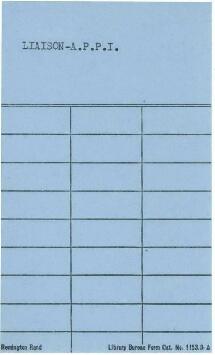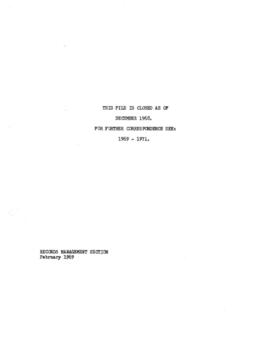Identity area
Reference code
Title
Date(s)
- 1944 - 2010 (Creation)
Level of description
Fonds
Extent and medium
784.51 linear feet of textual records; 169.79 linear feet of photographs; 2354 audio reels and cassette tapes; 60 CD-ROMs; 241 film reels; 5 film strips; 21 3.5" computer disks; 3640 videocassettes
Context area
Name of creator
Administrative history
The World Bank's external affairs function can be described as a hybrid: combining diplomatic and consultative activities commonly associated with a government's foreign ministry, with the public relations activities of a strategic communications firm. A functional definition of external affairs used in this fonds includes:
-
Developing and maintaining relations with external groups and shareholders, such as the media, the public, development community and Bank member countries in order to increase public support for, and awareness of, the mission and work of the World Bank Group;
-
Supporting high-level Bank staff in their interaction with external groups and shareholders;
-
Liaising with non-governmental and international organizations, including the United Nations. Note that, beginning in 1987, this sub-function was shuttled in and out of the units responsible for the external affairs function. As a result, records related to liaison can be found in other fonds. See the Related Units of Description below for location of records in other fonds;
-
Managing an internal communications program responsible for informing Bank staff of significant events and developments inside the Bank;
-
Publishing and distributing Bank research and technical and informational publications;
-
Coordinating technical assistance coordination activities. Note that EXT-related units were not the only ones responsible for this sub-function in the Bank and that in 1981 this sub-function was permanently and completely transferred to the Bank's regional operations units. See the Related Units of Description below for location of records in other fonds.
The following administrative history provides detail on the transfer of functions into and out of the units responsible for external affairs and provides more information on the nature of the functions described above.
1947-1967
The World Bank's external affairs function appears to have been established in 1947; there is no mention of it in the Bank's 1946 directory. Its first iteration was as the Public Relations Department (PRD) with Drew Dudley acting as Director. The Department reported to Vice President Robert Garner and was responsible for:
-
the development and application of Bank policies for the dissemination of information concerning the purposes, activities and accomplishments of the Bank;
-
planning, promotion, and execution of information programs in the Bank's member countries through print, media, and published speeches and booklets;
-
maintaining contactwith the United Nations (UN) and other international organizations;
-
cooperating with the Marketing Department on information programs affecting the sale of the Bank's securities;
-
and monitoring the press for commentary on the Bank and its work and circulating this information through the institution.
In late 1949, Drew Dudley was sent to Paris to be the Bank's new Director of Public Relations for Europe. The Bank's European Office was responsible for:
-
maintaining liaisons with the European member governments and European international organizations;
-
arranging for the sale of Bank securities in Europe, including the sale of portions of Bank loans;
-
carrying out information programs;
-
and performing administrative functions, particularly regarding accommodation and secretarial arrangements for meetings, translations, travel within Europe, etc.
Over the subsequent decades, the Bank opened offices in a number of other cities, including London and Tokyo, in order to perform public relations activities.
William Ayers briefly replaced Dudley as Director of PRD on 1 November 1949 but passed away shortly thereafter. Harold N. Graves was named the Department's new Director on 20 November 1950. He served in this role for the next seventeen years.
In 1951, responsibility for liaising with the UN and other international organizations was removed from PRD and placed in the new Technical Assistance and Liaison Department (TAL).
In 1953 the Department's name was changed to the Office of Public Relations. Two years later, in 1955, its name was changed again, to the Office of Information (INFO). The 1955 change coincided with an addition of new staff and new responsibilities. In addition to previously described activities, INFO was given the following responsibilities:
-
providing public relations services for the new International Finance Corporation (IFC);
-
publishing the Bank's Annual Report;
-
maintaining regular relations with the media;
-
arranging and publicizing speaking engagements for the Bank's Executive Directors, managers and staff, and assisting in writing speeches and scripts;
-
maintaining a films and photograph library on the Bank and its development work;
-
and clearing all materials proposed for publication by staff members.
INFO continued to report to Vice President Garner until his retirement from the Bank in 1956. Over the next decade INFO reported to: Vice President W.A.B. Iliff (1956-1962); Vice President Geoffrey M. Wilson (1962-1966); and Vice President and Chairman of the Loan Committee, J. Burke Knapp (1966-1967).
1967-1973
In 1967 the Office of Information reported to the Technical Assistance and Liaison Department's (TAL) successor, Development Services Department (DSD; see below for more detail on these two units). That same year William Clark replaced Harold Graves as the Office's Director.
The following year the Office was renamed the Information and Public Affairs Department (IPA). At the same time, divisions were created within the Department: Public Affairs Division (IPAPA); Afro-Asian Division (IPAAA, renamed the Africa, Middle East and Asia Division [IPAAM] in 1969); IFC Information Services (IPAFC); and the European Information Services Division (part of the European Office). In 1968, the Department's responsibilities included:
-
monitoring and analyzing outside events and opinion with regard to the Bank's operations;
-
preparing and distributing news announcements, brochures, reports, speeches and other items on subjects relating to the Bank Group's activities; .
-
maintaining relations with information media, academic institutions, business organizations, public affairs groups and other bodies;
-
organizing speaking programs and information conferences;
-
commissioning, obtaining and arranging for the outside use of films, photographs and radio tapes dealing with the Bank Group's activities;
-
supervising the production and distribution of books published by the Bank Group;
-
and maintaining an internal communications programaimed at keeping Bank staff informed of significant events and developments inside the Bank.
In January 1970 the IPA was moved out of the DSD and began reporting directly to the Office of the President (EXC). At the same time the Public Affairs Division (IPAPA) was terminated and, early the next year, an Editorial Division (IPAED) was created. IPAED's primarily responsibility was to handle the production of the Annual Report as well as the semi-regular publication "Policies and Operations" and the in-house publication, "Bank Notes". Note that "Bank Notes" was the successor to "International Bank Notes". The latter had been published by the Bank's Personnel Division since 1946.
1973-1981
In 1973, a major organizational change occurred with respect to the IPA and the aforementioned Development Services Department (DSD). A new External Affairs Staff (ERS) complex was created that was composed of the IPA, the Economic Development Institute (EDI), the European Office (EUR), and the DSD, which was renamed the International Relations Department (IRD). William Clark was named Director, External Affairs (DER); Lars J. Lind served briefly as Clark's replacement as Director of IPA before John E. Merriam became the new permanent Director. The following year, in 1974, ERS was elevated to the status of Vice Presidency (EXTVP) and William Clark was promoted to Vice President, External Affairs (VPE).
IPA and IRD would reside in the same Vice Presidency together until 1987. IRD had its origin in the Technical Assistance and Liaison Staff unit (1946-1961) and the Development Services Department (1961-1973); the latter was formed when the Technical Assistance and Liaison Staff (TAL) unit was combined with the Economic Development Institute (EDI), although EDI was removed from DSD soon after in 1964.
As of 1971, functions of the DSD included:
-
coordinating technical assistance and formulating policies and procedures for the administration of such assistance in conjunction with the operating departments;
-
establishing and maintaining formal relationships and working arrangements with Part I countries and other intergovernmental organizations, including the UN and its specialized agencies. Note that liaison with the UN was the responsibility of DSD's Special Representative to the UN, a position created in 1964 as a result of increased liaison activities with UN organizations and the Bank's expansion into agriculture and education project lending;
-
and conducting studies and proposing policies on questions ofgeneral concern to the Bank as assigned by the Bank President.
Prior to its inclusion in the new ERS, DSD also briefly included an Office for a Special Representative for Inter-American Organizations from 1970 to 1972 (at which point it was moved to the Front Office of the Vice President, Latin America and the Caribbean [LCNVP]). DSD also included the Secretariat of the Consultative Group on International Agricultural Research (CGIAR) from 1971 to 1973 (at which point it briefly reported to the Director, External Affairs before being reorganized into the Agriculture and Rural Development Department [AGP]). In 1973, the Bank's Economic Development Institute (EDI) began to report to IRD. The following year, however, EDI began reporting directly to the new EXTVP.
Between 1973 and 1982, the Information and Public Affairs Department (IPA) underwent only a few minor divisional changes. In 1973, the Africa, Middle East and Asia Division (IPAAM) was terminated and its functions were transferred to the re-established Public Relations Division (IPAPA), which consequently assumed responsibility for communications activities in all Part II countries. Further, an Audio-Visual Division (IPAAV) was opened to handle contacts with broadcasters and photographers, maintain a library of audio-visual materials documenting Bank projects, and provide technical support for audio-visual equipment to the rest of the Bank.
That same year, the IFC Information Services Division (IPAFC) was transferred out of the Department to the IFC Executive Director, External Relations. In late 1975, a Professional and Technical Publications Unit (IPAPT) was established to take on the administration of the Bank's ever-growing professional and technical publications program, which included the publication of country economic reports, sector reports, staff papers and books. And in early 1979, a News Unit (IPANS) was established in the Front Office of the Director, IPA; the Unit would later be upgraded to the Press and Information Office (IPAPI).
In 1978, the Bank's liaison activities with UN agencies in Europe were delegated to a newly established Geneva Office (IRDGO), staffed by a World Bank Representative to the UN and two assistants. The Geneva Office was established to reduce the workload of the Special Representative to the UN in New York, who was previously responsible for representation at all UN agencies of interest to the World Bank. Like the New York Office, the Geneva Office reported to the Director of the International Relations Department (IRD) in EXT.
1981-1987
In 1981, as a result of a joint ERS/Organization Planning Department (OPD) review of the Bank's external affairs function, the Information and Public Affairs Department was reorganized more significantly. The Public Affairs Division (IPAPA) was strengthened through the addition of a Unit responsible for Part I countries and additional staff for Part II country activities. In addition, the publishing functions located in IPA's Editorial Division and Professional and Technical Publications Unit were transferred to the newly established Publications Department (PUB) which would exist alongside the IPA, IRD, and European Office within the EXTVP. Staff and budgetary resources of PUB were increased and an effort to develop a more comprehensive publications program was undertaken. The department initially consisted of: an Editorial Division (PUBED); a Professional and Technical Publications Unit (PUBPT); and a Publications and Distribution Unit (PUBPD).
An important change in the International Relations Department occurred as a result of the ERS/OPD review. To satisfy a growing demand for technical assistance by member countries and for technical assistance experts by the regions, the Technical Assistance Division (IRDTA) and the Advisory Planning Division (IRDPL) were terminated and their activities were transferred to the regional vice presidencies and to the Central Projects Staff (CPS). As a result, IRD's primary responsibility became liaison with the UN system and other international organizations.
The following year, Frank R. Vogl replaced John Merriam as Director of IPA. The same year saw a number of divisional changes occur within IPA, although there was minimal impact on the unit's functions.
A more significant change was that, effective 1 April 1983, EDI was removed from the EXTVP and assigned to the Vice President, Operations Policy (OPS). From this point on, EDI, later renamed the World Bank Institute (WBI), would never again be part of the external affairs complex of functions.
1987-1997
As part of the 1987-88 Bank-wide reorganization under President Barber Conable, the Information and Public Affairs Department (IPA) was dismantled as was the Office of the Vice President, External Affairs (EXTVP). A new External Affairs Department (EXT) was established effective 1 February 1988 with Francisco J. Aguirre-Sacasa appointed as Director. EXT reported to the Office of the Senior Vice President, External Affairs and Administration (EAASV) alongside such sizable units as the Internal Auditing Department (IAD), General Services Department (GSD), Information, Technical, and Facilities Department (ITF), and Office of the Vice President, Personnel (VPPER).
Within EXT, among other smaller divisional changes, a new Internal Communications Review Committee was created to review all matters of internal communications requiring management attention. However, the most significant change internal to the EXT complex was the termination of the International Relations Department, which had been responsible for maintaining relationships with international organizations, NGOs, and the UN, among others, and the transfer of its responsibilities to the newly established Strategic Planning and Review Department (SPR). However, this departure was only temporary, as the departments related to the former IRD were returned to EXT by 1990 following the termination of SPR.
EXT only reported to EAASV through 1989. The Department then reported to the Office of the Senior Vice President, Policy, Research and External Affairs (PRESV) on 1 January 1990 alongside SPR, the Vice President, Sector Policy and Research (PREVP), and the Vice President, Development Economics and Chief Economist (DECVP). As part of this minor reorganization, the Public Affairs Division (EXTPA) and the Media and Communications Division (EXTMC) were merged into the new Information and Public Affairs Division (EXTIP). At this point, Alexander Shakow was named Director of EXT.
In 1990 the reorganized External Affairs Department was responsible for:
-
setting objectives and priorities, in conjunction with the EAASV, for the Bank's external affairs program;
-
marshalling support for the Bank and its work in Part I and Part II countries;
-
informing and maintaining regular contact with print and electronic media and with influential constituencies such as non-governmental organizations (NGOs), academia, parliaments and business groups;
-
publishing and disseminating Bank research, policies, and views on development issues;
-
gathering and feeding back information on outside events and opinions that bear on the Bank's operations;
-
and supporting and coordinating activities of the decentralized External Affairs staff.
In October 1991, all Senior Vice Presidencies, including the Senior Vice President, Policy, Research and External Affairs (PRESV), were abolished. EXT was transferred to the Personnel and Administration Complex and the EXT Director started reporting to the new Vice President, Personnel and Administration (PAAVP). No functions were altered during this change and the Department's divisions remained essentially the same. In the Bank's 1992 Directory, the functional responsibilities of the Department's Information and Public Affairs Division included: media information; editor: "Banks World"/Weekly Bulletin; editor; "World Bank News"; and business, finance, and community relations. The International Economic Relations Division responsibilities included: non-governmental organizations, United Nations,O.E.C.D., and E.C. liaison; Small Grants Program; and Development Committee. The publication function continued within the Department in the new Office of the Publisher (EXTOP).
On 1 January 1993, the International Economic Affairs Division as well as the UN Special Representative in New York were again removed from EXT and, with them, functional responsibility for liaison with NGOs and international organizations. The two were moved into the new Operations Policy Department (OPR) in the Human Resources Development & Operations Policy Vice Presidency (HRO).
By March 1994, EXT had been removed from PAAVP and began to again report directly to the Office of the President. In the fall of the same year, Mark Malloch Brown took over as Director of EXT. The Department's functions remained relatively unchanged. At this point, it maintained Information and Public Affairs (EXTIP) and Europe (EXTEU) Divisions as well as a number of units: Distribution (EXTDI); Editorial and Production Services (EXTEP); Film (EXTFM); Marketing (EXTMT); and Publications (EXTPB). The London Office (EXTLO), Office of the Publisher (EXTOP), and Tokyo Public Affairs staff also reported to the EXT Director.
By January 1996 the Department was upgraded to a Vice Presidency, making Brown the Vice President of EXT. In April of the same year, the UN liaison function was returned to EXT in the form of the United Nations Affairs Office (EXTUN). Functions otherwise remained constant in the new VP with the exception of the creation of a small grants program. Functions related to rights and contracts and regional operations support were added in 1998.
1997-present
Bank President Jim Wolfensohn's Bank-wide reorganization of 1997-98 introduced a small number of managing directors through which Vice Presidents would report to the Office of the President. However, External Affairs reported to both Managing Director Sven Sandstrom and directly to the Office of the President. Despite the reporting structure and other changes in the Bank, the functions of the EXT Vice Presidency were not changed. This is reflected in the units that constituted EXTVP: Media; Part 1 Relations; Internal Communications; Regional Operations; Office of the Publisher; and the Special Representative, New York UN Office. The Vice President, Europe as well as the Resident Representative to the U.K. and the Special Representative, EU Institutions, also reported to EXT.
In the summer of 1999, Mats Karlsson became the Vice President of EXTVP. At some point between September 1999 and September 2000 the VP changed its name to emphasize the inclusion of the UN liaison activity, becoming the External Affairs and UN Affairs Vice Presidency.
In 2002, EXT partially regained responsibility for liaison with NGOs and international organizations. In 1997 the function had moved from the Operations Policy Department (OPR) to the Social Development Department's Non-Governmental Organization Division (SDVNG). In 2002, functional responsibility for coordinating the Bank's corporate engagement work with international and non-governmental organizations was returned to EXT. This was, however, limited to the external aspects of the function; SDVNG maintained responsibility for internal policy and planning work related to liaison. As part of this team-based approach, the two cooperated on activities such as dialogue and consultation, staff training, and knowledge management.
In 2002 Vinay K. Bhargava served briefly as acting VP of EXT. He was replaced by Ian A. Goldin in 2003. That same year saw achange in name to the VP that more accurately reflected its responsibilities: External Affairs, Communications, and United Nations Affairs. According to the 2003 Bank Directory its functional responsibilities now included: media relations and broadcast services; internal communications, including web and "Bank's World Today" publication; community outreach; UN relations; US relations; civil society (i.e. international and non-governmental organizations) relations; speaker's bureau (i.e. speechwriting for high-level Bank staff); World Bank InfoShop management; publications production services; publications marketing and rights; publications acquisitions and client relations; and resource management.
In 2007, Marwan Muasher replaced Goldin as head of EXTVP. He served in this position until 2010. Caroline Anstey acted as EXTVP for about a year before Cyril Muller assumed the position in November of 2011.
In 2013, EXTVP was part of a broader reorganization of the Bank's corporate support functions. The external relations of the IBRD and IDA managed by EXTVP were integrated with the International Finance Corporation's (IFC) Corporate Relations (CCR) to form the new External and Corporate Relations Vice Presidency (ECR). ECR formed one part of the new World Bank Group Integrated Services (WBGIS) along with the Human Resources Vice Presidency (HR) and the Information and Technology Solutions Vice Presidency (ITS). Together, the three VPs reported to Managing Director Caroline Anstey. Cyril Muller continued onas Vice President of the new unit.
Aside from the integration of IFC support, ECR's functions remained relatively unaltered. As of February 2015, the unit's website described its activities as follows: "ECR manages corporate communication and relationships with key stakeholders, including media, civil society, private sector, donor countries, and international organizations, as well as coordinating staff engagement and internal communication within the Group. ECR publishes the WBG's research and knowledgeproducts, and manages the Group's corporate identity and branding. ECR is also responsible for the Bank Group's corporate online and social media presence, and produces content for a wide variety of platforms, including print, broadcast, and web."
Repository
Archival history
Records in this fonds were transferred to the World Bank Group Archives either directly from the responsible unit or from the Bank's 'Central Files'. In the case of the former, approved records retention and disposition schedules were used. Prior to the initiation of direct transfer of records to the Archives in the 1990s, departments and Vice Presidencies, including those responsible for external affairs functions, transferred their records to the Bank's centralized filing unit where they were arranged into Bank-wide classification schemes. These records were only later transferred into the custody of the Bank Archives.
Immediate source of acquisition or transfer
Content and structure area
Scope and content
Records in this fonds relate to the functions of the external relations complex as described in the Administrative History field above. In addition, records created and received by EXT Vice Presidencies are also included. Note that, periodically, the EXTVP contained units responsible for functions not included in the above definition. See Related Units of Description below for direction to the fonds containing those records.
Appraisal, destruction and scheduling
Accruals
Accruals are expected.
System of arrangement
Conditions of access and use area
Conditions governing access
Records are subject to the World Bank Policy on Access to Information.
Conditions governing reproduction
Records are subject to the Copyright Policy of the World Bank Group.
Language of material
- English
- Amharic
- Arabic
- Bengali
- Czech
- German
- Spanish
- French
- Hindi
- Italian
- Japanese
- Latvian
- Burmese
- Polish
- Portuguese
- Russian
- Swahili
- Turkish
- Chinese
Script of material
Language and script notes
Physical characteristics and technical requirements
Finding aids
Allied materials area
Existence and location of originals
Existence and location of copies
Related units of description
Notes area
Alternative identifier(s)
Access points
Subject access points
Place access points
Name access points
Genre access points
Description control area
Description identifier
Institution identifier
Rules and/or conventions used
Internal World Bank Group Archives rules based on ISAD(G).
Disclosure status
Level of detail
Dates of creation revision deletion
25 February 2015


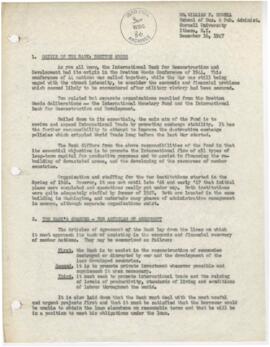
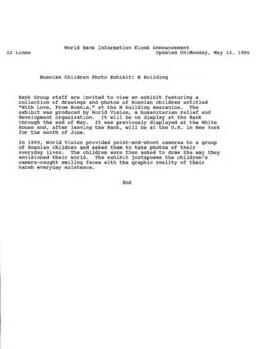
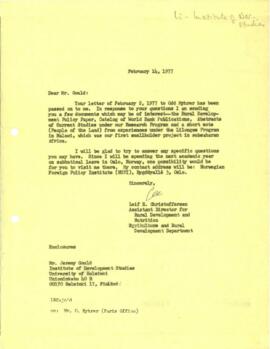
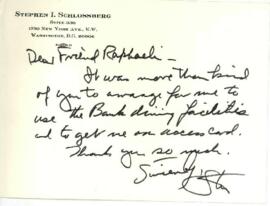
![United Nations Organizations - ERIU - International Labor Organization [ILO] 1978 / 1980 Correspo...](/uploads/r/world-bank-group-archives/4/e/6/4e64b1bf6919d45b973e67a9a3658d7e85fe8a9c891d0c11fd1c00b94ad4047c/WorldBankGroupArchivesFolder30046814_142.jpg)
![International Labour Office [ILO] - Liaison File - Volume 01](/uploads/r/world-bank-group-archives/f/c/6/fc64dc299723135dde42a12ddf7cab100dcf4f8c9d346fc5f38f13c40c74fb32/WorldBankGroupArchivesFolder1055953_142.jpg)
![Bank Administration and Policy : International Labor Organization [ILO] - 1975 / 1977 Corresponde...](/uploads/r/world-bank-group-archives/7/b/c/7bc19434f02e5104d0c46234c2e466b4dcfb5f1a719316d66e610866342363f3/WorldBankGroupArchivesFolder30044875_142.jpg)
![Bank Administration and Policy : International Labor Organization [ILO] - 1975 / 1977 Corresponde...](/uploads/r/world-bank-group-archives/b/4/6/b4635493df5dc31ef1b73d2efde57790c8c7173558b43c05af713ac2d0541317/WorldBankGroupArchivesFolder30044878_142.jpg)
![United Nations - ERIU - International Labour Organization [ILO] 1984 / 1986 Correspondence - Volu...](/uploads/r/world-bank-group-archives/f/9/2/f921113fec4c4f47a1c43e51a6df28a2de0e136f9061934ab3dd0a8ae62d2fae/WorldBankGroupArchivesFolder1065320_142.jpg)
![International Labour Office [ILO] - Liaison File - Volume 02](/uploads/r/world-bank-group-archives/4/b/6/4b67770833c784e447287d9b0e38e07e481d10d3f206bf2e9842ba37de3cba57/WorldBankGroupArchivesFolder30037226_142.jpg)
![Bank Administration and Policy : International Labor Organization [ILO] / International Bank for ...](/uploads/r/world-bank-group-archives/8/5/3/853dd8552e0f85dc59809609536489f6e4769f9140ec5cf2394f7b2770db432f/WorldBankGroupArchivesFolder1056343_142.jpg)
![Bank Administration and Policy : International Labor Organization [ILO] - 1975 / 1977 Corresponde...](/uploads/r/world-bank-group-archives/1/d/a/1da583d25a84e4dc94867601b99fc0145c0d3e07018eac943c53f7df5ba7f290/WorldBankGroupArchivesFolder1056342_142.jpg)
![International Labour Office [ILO] - Liaison File - Volume 03](/uploads/r/world-bank-group-archives/1/5/a/15abd1d5144a934119378933aa556c14ad4ec4528db2138d29cf84641e74a216/WorldBankGroupArchivesFolder30037230_142.jpg)
![International Labour Office [ILO] - Liaison File - Volume 04](/uploads/r/world-bank-group-archives/2/7/3/273f56f3c5caffc7686874b10bdcbcbe4a2cf7781addf417d7df52cb6c6651b0/WorldBankGroupArchivesFolder30037231_142.jpg)
![Liaison - United Nations [UN] - International Bank for Reconstruction and Development [IBRD] / I...](/uploads/r/world-bank-group-archives/9/a/e/9ae5aa9a5bf110f7c91d96dedd5330126a2d28609b08940fcb273c6ddb079276/WorldBankGroupArchivesFolder30151643_142.jpg)

![Liaison - International Bank for Reconstruction and Development [IBRD] / International Labour Off...](/uploads/r/world-bank-group-archives/d/7/3/d734d2869256659c6f7f8f18e11d81a5a68193bd958cfd37fb2567070b48031a/WorldBankGroupArchivesFolder30151642_142.jpg)
![External Relations International United Nations [ERIU] - International Labour Office [ILO] - 1987...](/uploads/r/world-bank-group-archives/e/f/e/efe3e225c18b4c3646959514c3e5c186383cc4b0267cec371ec92b2bc9aac02a/WorldBankGroupArchivesFolder1179716_142.jpg)
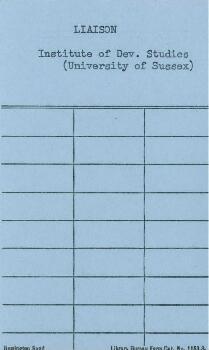
![International Labour Office [ILO] - Liaison File - Meeting on Evaluation of Comprehensive Employe...](/uploads/r/world-bank-group-archives/5/b/b/5bb2eba98ae82014eb17154c417c5d9b1e84d9785e22a88aeba8459068e73547/WorldBankGroupArchivesFolder30037229_142.jpg)
![United Nations Organizations - ERIU - International Labor Organization [ILO] 1978 / 1980 Correspo...](/uploads/r/world-bank-group-archives/c/d/c/cdc74c9724f4739c98dbdb88cc0965f10cefc9145567eeb892ff554a442edca4/WorldBankGroupArchivesFolder1063286_142.jpg)
![World Health Organization [WHO] - Liaison File - Volume 01](/uploads/r/world-bank-group-archives/8/d/5/8d5953969cb1a5bef692a2b6b3c4652d0a47407b033fc1e5061a35d2a1ea39cc/WorldBankGroupArchivesFolder1056032_142.jpg)
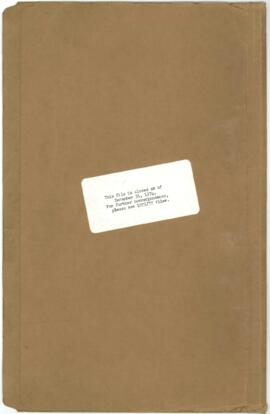

![World Health Organization [WHO] - Liaison File - Volume 02](/uploads/r/world-bank-group-archives/2/a/d/2ad0ba3a986a24334af881f26f117a28e82ba85900efb1932efe4297d910d128/WorldBankGroupArchivesFolder30039422_142.jpg)
![World Health Organization [WHO] - Liaison File - Volume 03](/uploads/r/world-bank-group-archives/6/c/a/6ca27fed8801c2bb6fc4216079a0d26162ef0775e1e0f0a86df79b235c9bcf60/WorldBankGroupArchivesFolder30039423_142.jpg)
![World Health Organization [WHO] - Liaison File - Volume 04](/uploads/r/world-bank-group-archives/9/b/8/9b8e21d8806bea3f7c36d76357edbbef183e5d7adf0446a06b9ed8e4a2714cd0/WorldBankGroupArchivesFolder30039424_142.jpg)
![World Health Organization [WHO] - Liaison File - Volume 05](/uploads/r/world-bank-group-archives/2/c/e/2cebbb47abf9863af9ee9e3edb4433981f0febda610ad51f3ee792b1f72852f1/WorldBankGroupArchivesFolder30039425_142.jpg)
![World Health Organization [WHO] - Liaison File - 1972 / 1974 - Volume 07](/uploads/r/world-bank-group-archives/5/1/1/5110a9dfd6f13a8ac2370cda8cfa86cd5d4cc771d0a03ebe8be2046ae1a53dbc/WorldBankGroupArchivesFolder30039426_142.jpg)
![World Health Organization [WHO] - Liaison File - 1972 / 1974 - Volume 06](/uploads/r/world-bank-group-archives/d/5/7/d5773917b3c83a8946dd97489b0c03159c411c4851d6d6c5d918e43262db911b/WorldBankGroupArchivesFolder30039427_142.jpg)

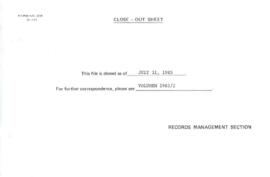
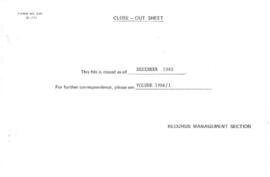

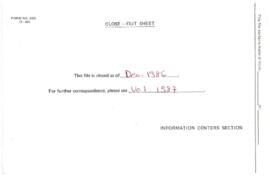

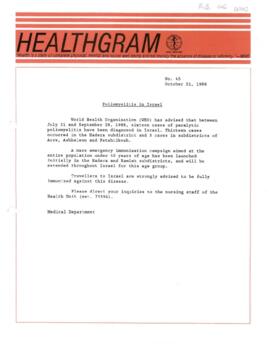
![United Nations Education Scientific and Cultural Organization [UNESCO] - Correspondence - Volume 1](/uploads/r/world-bank-group-archives/7/2/f/72f41756010ecef9af7a80526159c31caea9fc02355056abd8b653a1b1f6961b/WorldBankGroupArchivesFolder1596924_142.jpg)
![United Nations Educational, Scientific and Cultural Organization [UNESCO] - G6 - 1986 - Volume 2](/uploads/r/world-bank-group-archives/4/a/5/4a548fc2d7cb655af3815a39f3236dc037f5e450eb16e945301c03b5ffde6d57/WorldBankGroupArchivesFolder30376171_142.jpg)
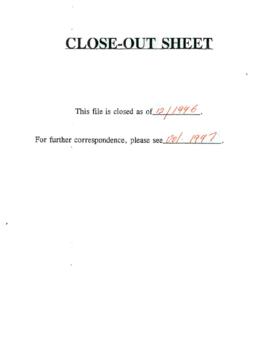
![United Nations Educational, Scientific and Cultural Organization [UNESCO] - G6 - 1987 - Volume 3](/uploads/r/world-bank-group-archives/d/2/e/d2e3b5f0365208efe7bac71d7b49cb13bdb2681d8b4db0c5e1b69cee4979926c/WorldBankGroupArchivesFolder30376172_142.jpg)
![United Nations Educational, Scientific and Cultural Organization [UNESCO] - G6 - 1988 - Volume 4](/uploads/r/world-bank-group-archives/7/4/2/742dc7927e54c405e0cd6f448fba329221adab37cffc80e6eab5f45f15d7f69c/WorldBankGroupArchivesFolder30376173_142.jpg)
![United Nations Educational,Scientific and Cultural Organization [UNESCO] - G6 - Correspondence - ...](/uploads/r/world-bank-group-archives/0/5/4/0547a9f67bddc59f3d7f7d39939acfddbf1fb113da3a2f380dbf5b7303d722b4/WorldBankGroupArchivesFolder1242430_142.jpg)
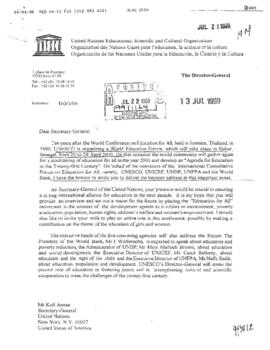
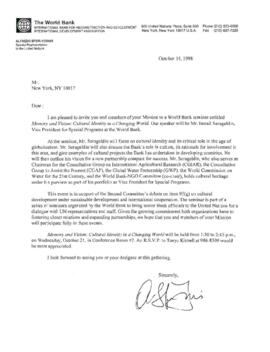
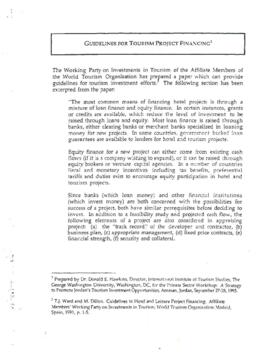
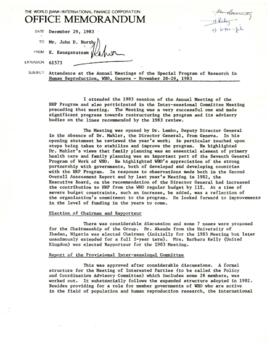
![Association of International Study for Promotion and Protection of Private Investments [APPI] - ...](/uploads/r/world-bank-group-archives/8/0/e/80e73d869f68a842b70314472c5b1e2532f079f9be8c84f467a9b09b0bae589c/WorldBankGroupArchivesFolder1055889_142.jpg)
